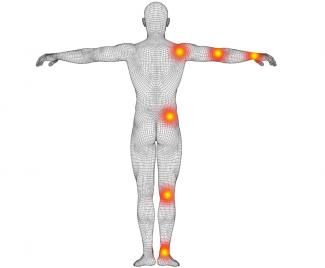
Inflammation has been linked to a slew of diseases – from allergies to cancer, heart trouble, bowel problems and diabetes. What is it and how can we protect ourselves. - By paediatrician and family practitioner Dr Gita Mathai.
What is inflammation?
The word is derived from the Latin “inflammo” meaning ignite or set alight. It conjures up visions of fire, and it is the body’s response to an injury, like a broken bone, a scrape in the skin or an infection by an organism (bacteria, virus, parasites). As soon as the affected cells of the body signal the presence of an invader or danger, an army of white blood cells descend on the scene to defend and protect it from harm. This inflammation is an innate genetic response. Other inflammatory responses (especially to diseases) have to be learnt either by immunisation against the disease or because of a previous exposure to the same organism. This is acute inflammation, a time-bound process (a good inflammation) that subsides either on its own or with a short course of treatment.
Inflammation can be misguided against the body’s own normal cells, too. This “attack on self” is chronic, low-grade and long-lasting. It is the basis of autoimmune diseases like rheumatoid arthritis, systemic lupus erythymatosis (SLE) and polymyalgia rheumatica.
Attacks against self are not necessarily due to disease. It occurs as a normal consequence of ageing, with obesity, elevated blood sugar and lipid levels. It is the actual causative factor behind allergic respiratory diseases like asthma, and inflammatory bowel diseases like ulcerative colitis and Crohn's disease. It is responsible for many of the long-term complications of diabetes and the forward march of cancer. We are not aware of this silent process going on in our body.
What are the signs of inflammation?
The signs of acute inflammation are described by the commonly used acronym PRISH. It stands for Pain, Redness, Immobility (loss of function), Swelling and Heat. But the classic Latin description of acute inflammation, describing dolor (pain), calor (heat) rubor (redness), tumour (swelling) and functio laesa (loss of function) described in 34 BC holds good even today.
Chronic inflammation on the other hand is an invisible, slow process. It does not have the PRISH signs. It incapacitates by making the patient ill gradually so that the exact date when the illness started cannot be accurately pinpointed. Usually the person says, “I have been ill for several months....” It is confirmed by blood tests. The levels of C Reactive Protein (CRP), Tumour Necrosis Factor – Alpha, Nuclear factor kappa, interleukins and eicosinoids can be tested. The values will be high and above the normal ranges as defined by the laboratory doing the test.
Inflammation, good or bad?
In acute inflammation, the body goes to war against the invading agent or insult. In this case it is a good thing because the body’s defense mechanisms align with medication and, working in tandem, attempt to overpower the disease-causing organism.
In chronic inflammation, the war is against one’s own body. Gradual destruction of cells and morbidity can occur unless the problem is properly tackled and treated.
Foods aggravating chronic inflammation
Processed foods like sugar, flour, polished rice, peanuts and food containing transfats are notorious offenders. During the digestion of these products they are broken down into their primary constituents, which are absorbed into the blood stream. They can initiate cascading biochemical reactions responsible for chronic inflammation.
Foods that help fight inflammation
Some natural foods help fight destructive chronic inflammation because of their high content of protective antioxidants and carotenoids. These foods are fish, like mackerel or tuna, nuts like almonds, low-fat dairy products, soy, coloured vegetables and fruits (red and yellow) and green leafy vegetables. Tomatoes provide value for money as they contain almost all the essential vitamins and micronutrients and are a complete vegetable. Spices like turmeric, ginger, garlic and onions are now scientifically proven to be beneficial.
Medications that fight inflammation
Steroids reduce inflammation dramatically. However they have potent side effects like fluid retention, rise in blood pressure, precipitation of diabetes, weight gain, cataracts, glaucoma, easy bruising, delayed wound healing and weak bones. They are usually prescribed for short periods to tide over acute life-threatening inflammation.
NSAIDs (Non-Steroidal Anti-inflammatory Drugs) can be used to treat acute inflammation. They are also used for the long-term suppression of chronic inflammation. NSAIDs block the action of a compound called prostaglandin which is responsible for acute inflammation. Commonly used NSAIDs are naprosyn, aspirin, ibuprofen, piroxicam, indomethacin, diclofenac and celecoxcib. All NSAIDs cause gastric irritation. Diclofenac affects the kidney if taken on a long-term basis. Celecoxcib and its derivatives affect the heart.
In some diseases like rheumatoid arthritis, which cause chronic inflammation, long-term maintenance with disease modifying drugs (DMARDs) are required to suppress the inflammation. These are medications like hydroxychloroquine, methotrexate, sulfasalazine, azathioprine, D-pencillamine and gold compounds. These drugs have side effects like alteration of liver enzymes and suppression of the bone marrow. This causes anaemia, low white cell count (person is more prone to infection) and low platelets (bleeding tendency).
There are newer second line DMARDs like leflunomide, atanercept, infliximibab that are very potent. They need to be prescribed and used under medical supervision.
Lifestyle alterations to fight inflammation
It is possible to reduce the effects of chronic inflammation in the body by modifying diet and lifestyle.
• Avoid red meat, eat white meat, fish, fruits and vegetables (try to take at least 4-6 helpings of fruits and vegetables a day)
• Stop poisoning the body with alcohol (though red wine does have some beneficial anti-oxidant and anti-inflammatory properties), cigarettes and recreational drugs.
• 30-40 minutes of aerobic exercise in the fresh air with exposure to sunshine will reduce chronic inflammation in the body.






